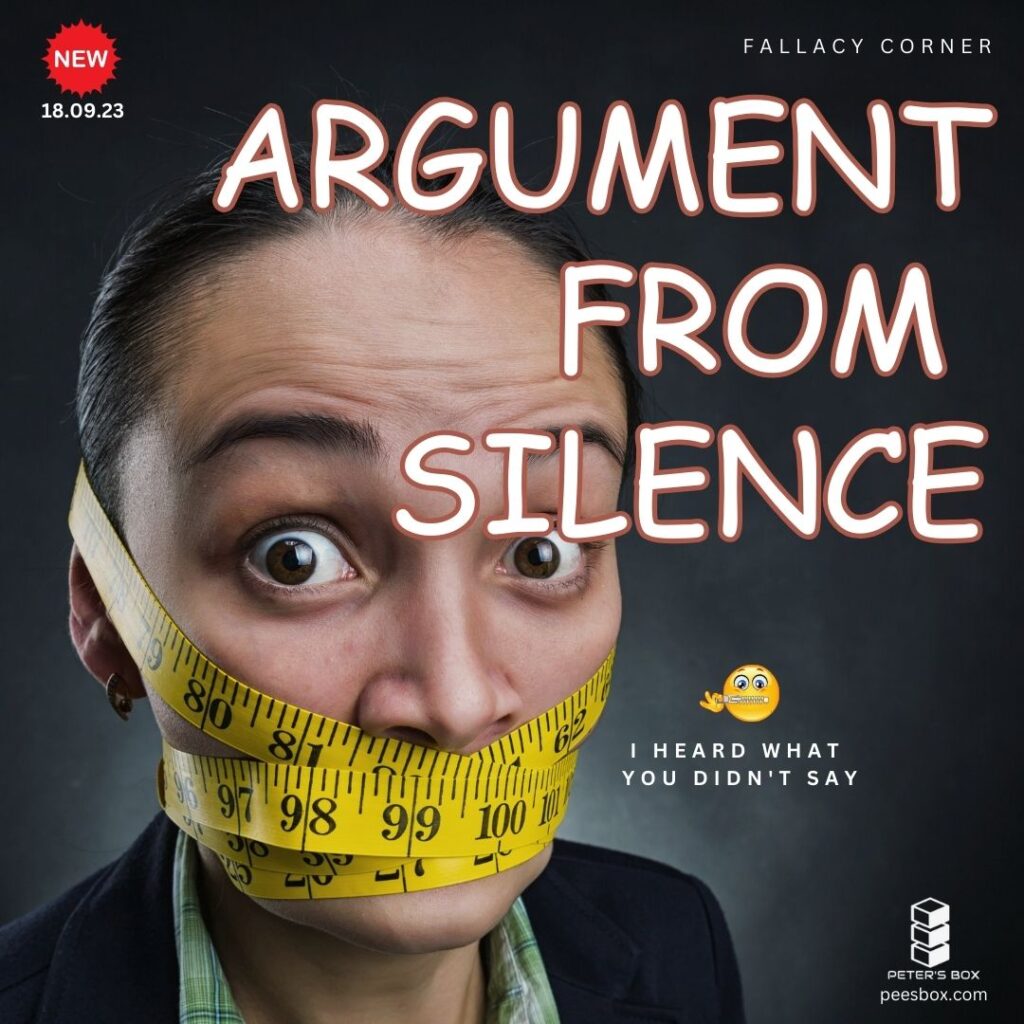Last updated on September 25th, 2023 at 12:59 pm
An argument from silence is a logical fallacy I like to call the ‘I heard what you didn’t say’ fallacy. You will understand why in a second. If you’re not acquainted with logical fallacies, check out the post ‘Beware of the Beast: An Introduction to Logical Fallacies‘ for a quick primer.
What is a logical fallacy?
A logical fallacy is an error in reasoning. It is a flaw that weakens the strength of an argument. It does not always follow that the conclusion is incorrect. It only indicates that the supporting premises (reasons) that were utilised to support the conclusion are flawed and hence not compelling. Furthermore, if you come across a faulty argument, it is preferable not to accept the conclusion unless you are convinced differently. A logical fallacy is the use of defective or otherwise flawed thinking in the creation of an argument that, if overlooked, appears to be well-reasoned.

Argument from Silence
The argument from silence fallacy is a particularly tricky kind of fallacy because it can inflict unrecoverable consequences on an argument if listeners take it at face value. The ‘Argument from Silence’ fallacy is sometimes used intentionally in an effort to swiftly persuade listeners to one’s viewpoint by drawing attention to the silence of the opposing party. Politicians often employ it in debates. We will take a look at some examples soon.
Have you ever unintentionally put words in your opponent’s mouth? Or have you ever assumed that a point you presented was correct just because your opponent did not respond? If you have, you are already aware of how the Argument from Silence works. The argument from silence is also known as the appeal to silence fallacy. In Latin, this is known as argumentum ex silentio.
Definition of the fallacy
An argument from silence is a logical fallacy that uses the lack of a response to a claim to reject or accept the claim as true or untrue. Let us start with a simple definition. An argument from silence occurs when a statement is accepted as true or false because there has been no response to the claim.
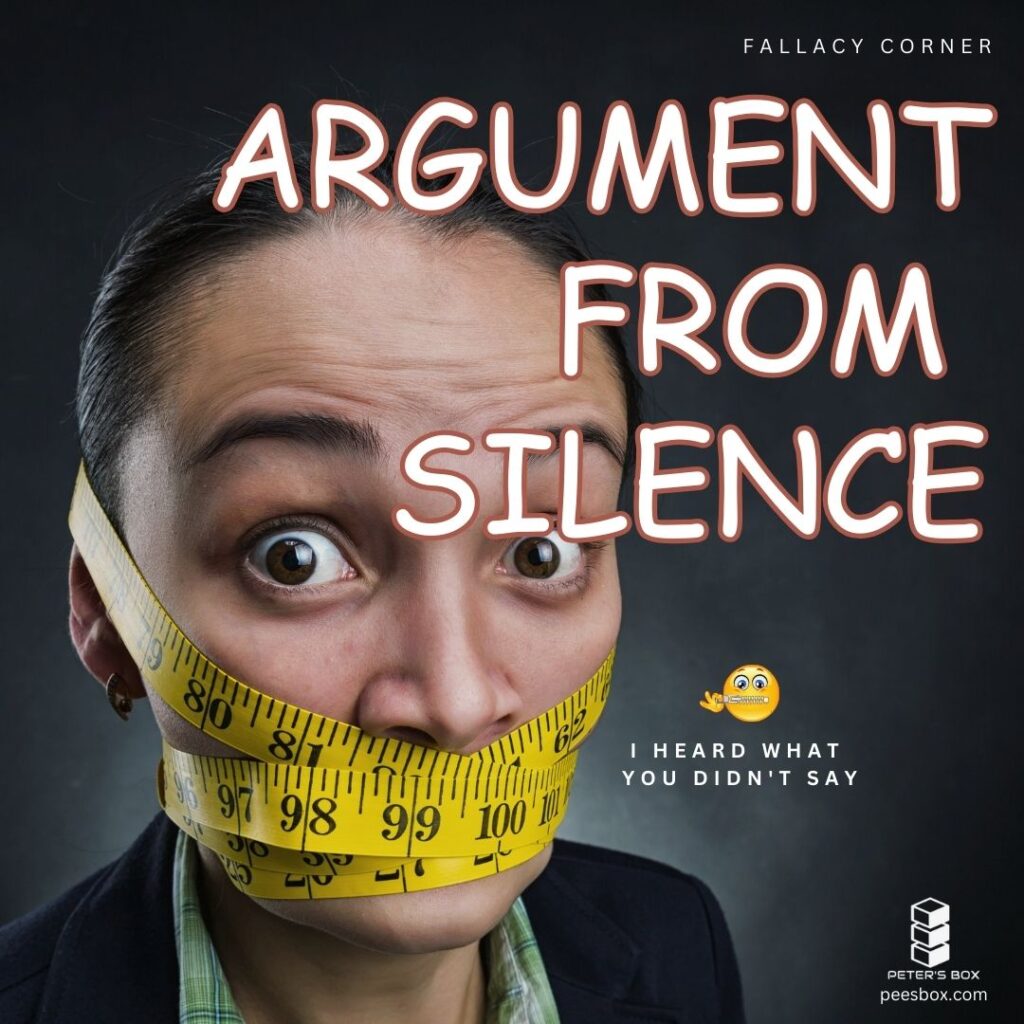
Structure of the fallacy
An argument from ignorance has the following basic structure:
- A claim has been made; there is no opposing view, and therefore, because there is no opposing view, the claim must be true. OR
- A claim has been made, but there has been no response from the listener; therefore, the listener agrees that the claim must be true. OR
- Person X makes a claim A, and person Y remains silent; therefore, claim A is true or false.
- Person X makes a claim; person Y responds but fails to mention event A or fact B; and person X concludes that his claim is true due to Y’s failure to mention event A or fact B.
Example #1
Kofi: You took my book. Where is my book?
Ama: How are you, Kofi?
Kofi: I knew you took my book.
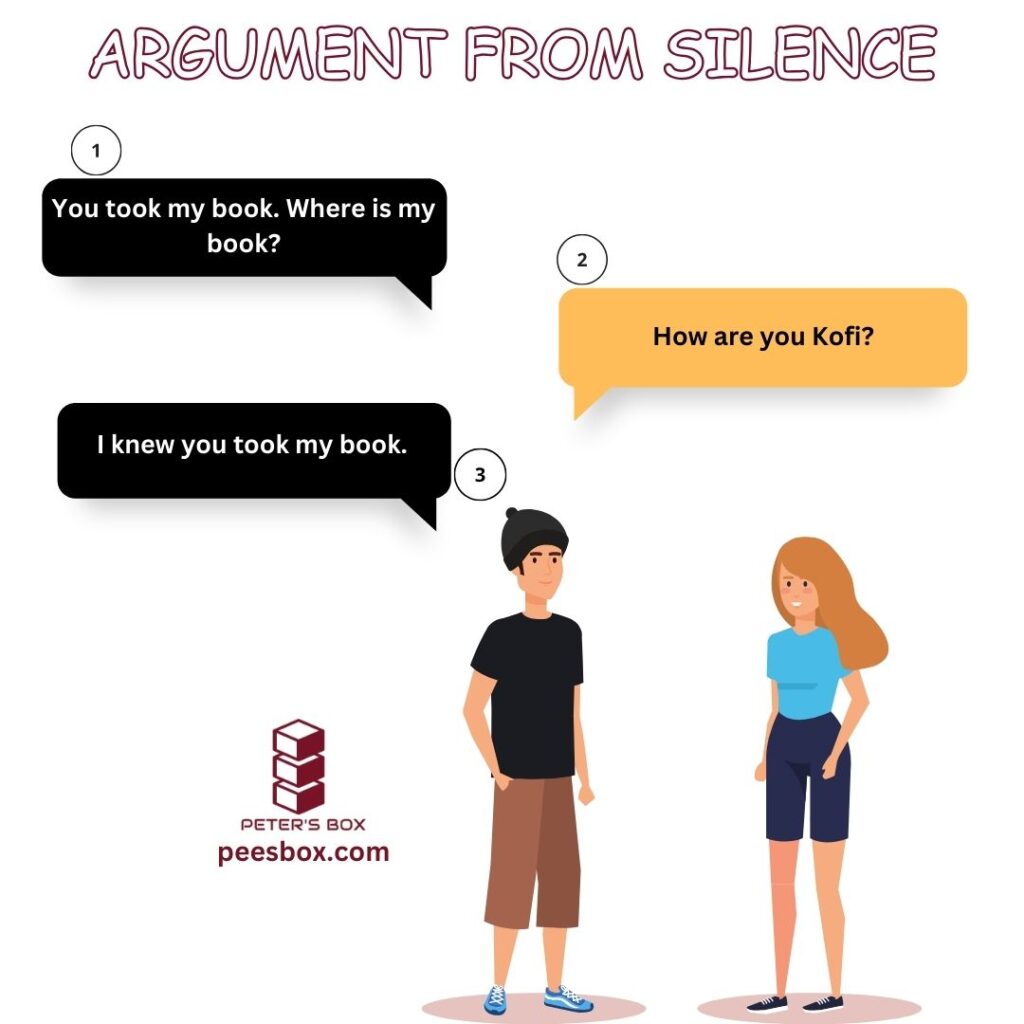
In this example, Kofi has committed the argument from silence fallacy. Kofi’s reasoning is that since Ama did not respond to his claim, Ama must be guilty of the claim. Kofi is taking Ama’s silence to mean that Ama agrees with his claim. But does silence mean consent?
Example #2
Teacher: You guys are very smart. Do you understand the explanation now?
Students: ….
Teacher: Good. I see you understand it now. I know you guys are smart.
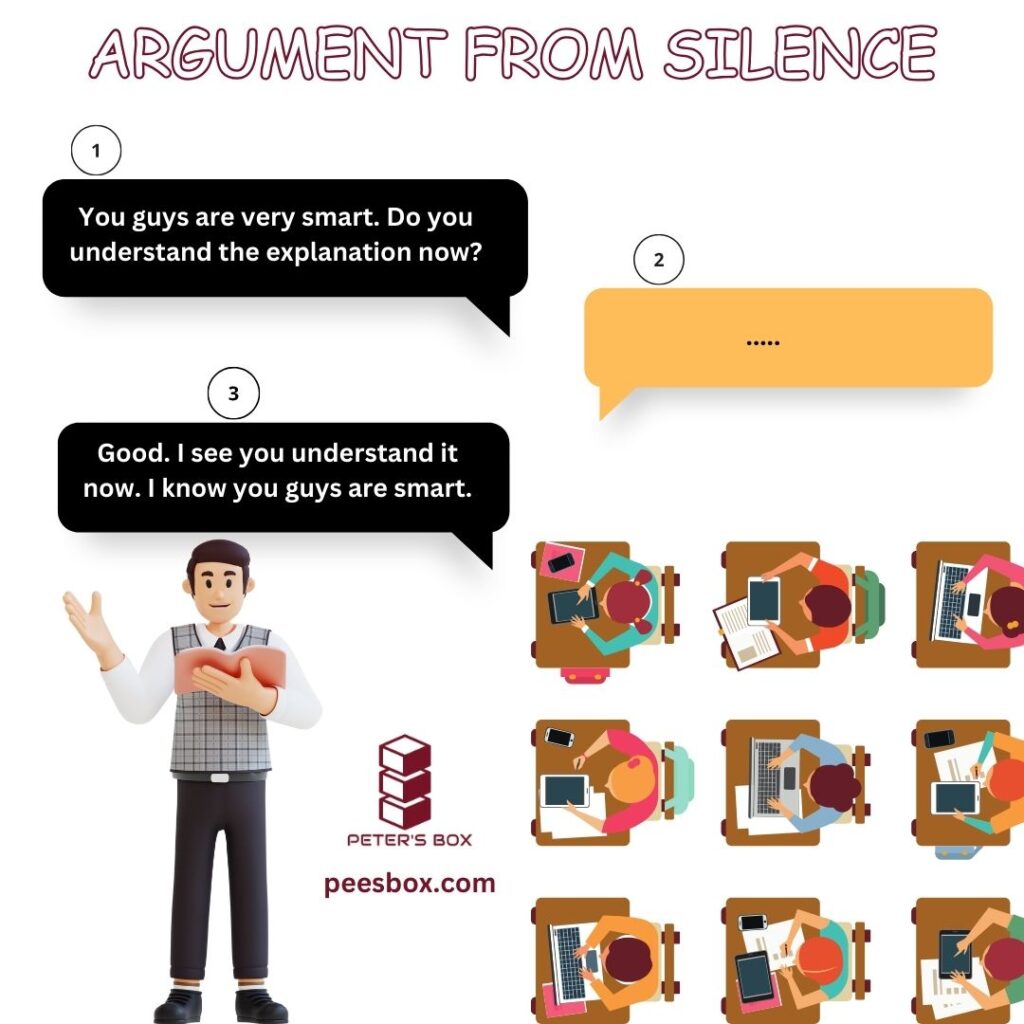
In this example, the teacher committed the argument from silence fallacy. He claims that his students are smart. Then he asks them if they understood his explanation. The students remained silent. The teacher concludes that they understood his explanation because no one responded to his question.
Common formats
There are certain typical statements used in arguments that will most likely indicate that an argument from silence fallacy has been or is about to be committed. Here are a few examples:
- I knew you would agree with me.
- I knew it!
- There you go!
- You have nothing to say?
- If it wasn’t true, we would have known by now.
Example #3
Lawyer: Mr. Williams obviously murdered this man.
Mr. Williams: But I wasn’t even in the country at the time of the man’s death.
Lawyer: Who does the knife belong to, then?
Mr. Williams: I don’t know.
Lawyer: Ah, your honour, there we have it. Mr. Williams murdered the man. I rest my case.
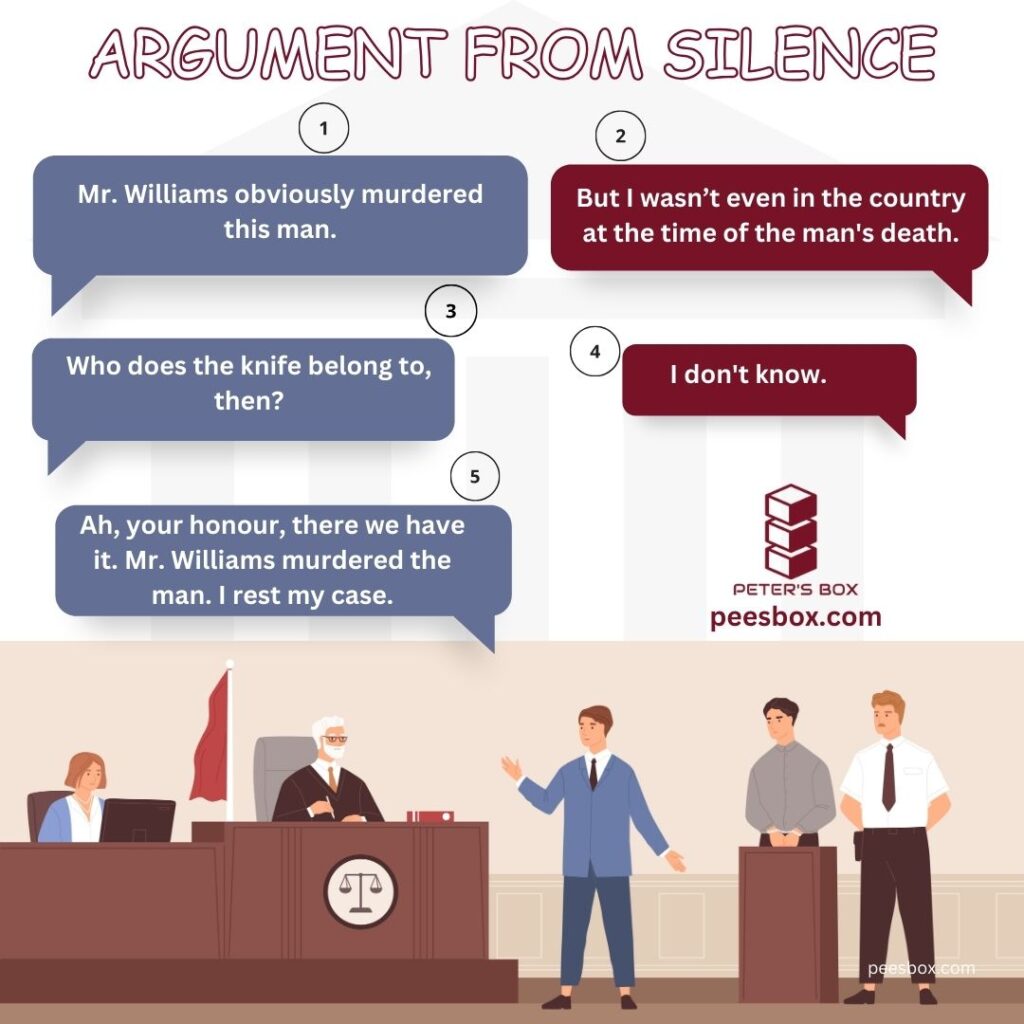
In this example, if the court agrees with the lawyer’s conclusion because Mr. Williams was unable to respond to the lawyer’s query, the court has fallen victim to the argument from silence. Just because Mr. Williams didn’t answer the question to the lawyer’s content doesn’t make the lawyer’s assumptions true. When the lawyer concluded that Mr. Williams murdered the man, he based it on the fact that Mr. Williams could not prove that the knife didn’t belong to him. The lawyer has committed the argument from silence fallacy since Mr. Williams did not mention anything about the knife, but the lawyer is using that silence to conclude that Mr. Williams must have murdered the man.
The Miranda Warning
However, keep in mind that in some circumstances, such as court proceedings, the defendant’s responses might help the prosecution or defence win the case. This is why the Miranda warning is given in every police arrest across the world.
You have the right to remain silent. Anything you say can be used against you in court. You have the right to talk to a lawyer for advice before we ask you any questions. You have the right to have a lawyer with you during questioning. If you cannot afford a lawyer, one will be appointed for you before any questioning, if you wish. If you decide to answer questions now without a lawyer present, you have the right to stop answering at any time.
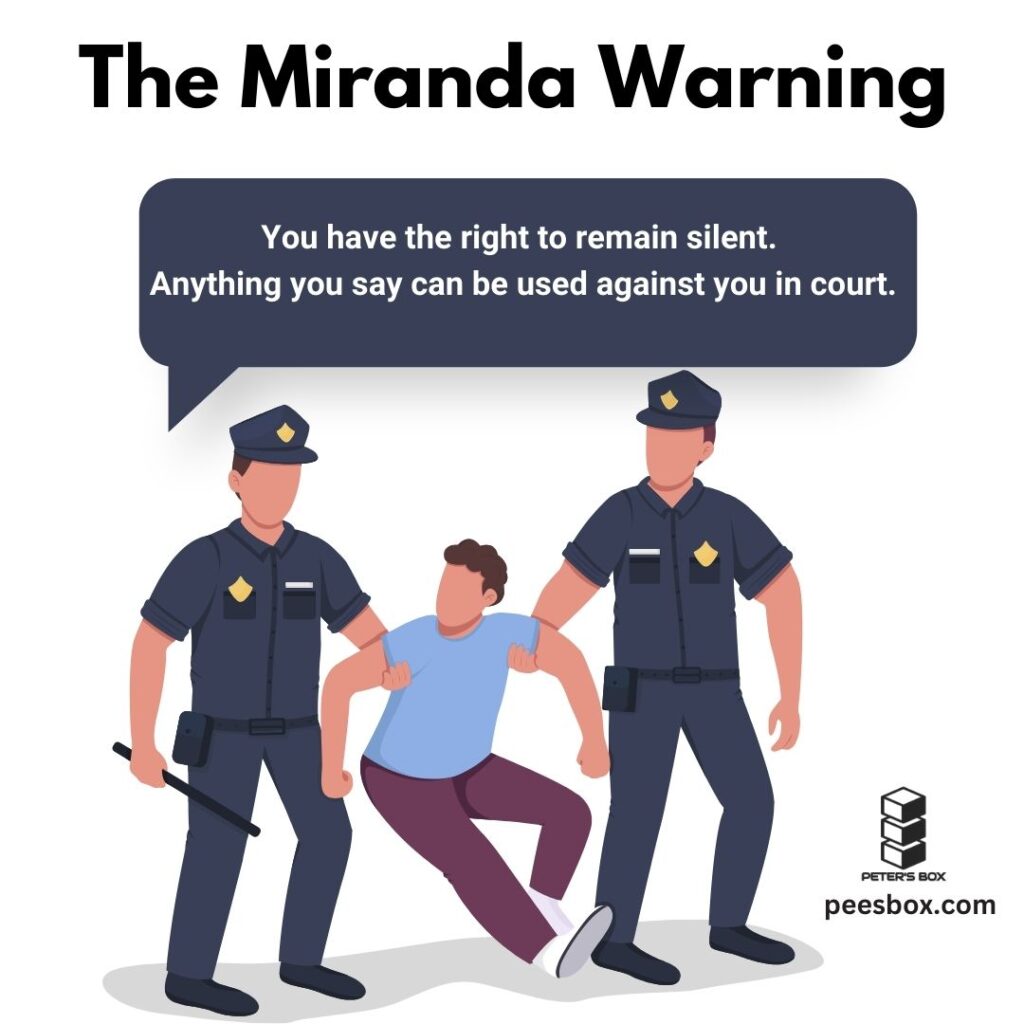
Silence can be a tool
Answers give more information, which aids decision-making. For example, Mr. Williams stated that he was not in the country at the time the victim was murdered. If this is shown to be true, it will be difficult to charge Mr. Williams with murder, even if the knife belonged to him.
Argument from Silence in history
The examination of history is a prominent topic where arguments from silence are prevalent. This occurs frequently during the citation of sources. These appear to be the strongest and soundest defences that can be made, yet they are really the weakest. It is a mistake to disregard a claim or argument from a source simply because no other source discusses it. Consider the following conversation:
Person A: Jesus walked on water.
Person B: The New Testament is full of incredible stories that cannot be found in other sources. If Jesus walked on water, other writers during that time would surely have mentioned it. And because no other source does, it probably didn’t happen.

Person B appears to be presenting a compelling case, right? It looks like Person B wants to prove the assertion is true beyond a shadow of a doubt, which makes it seem persuasive. However, it is not a convincing argument. Simply because an action or occurrence was not documented by others does not mean it did not occur. Furthermore, whether or not an allegation was recorded in writing is irrelevant to its veracity!
Eruption of Mount Vesuvius
A volcanic eruption occurred on Mount Vesuvius in the year 79 AD. One of the worst catastrophes to ever strike the Roman Empire was this. Two cities were entirely destroyed. Scholars estimate that 16,000 to 60,000 individuals died in the disaster. Many of the victims belonged to the rich and well-educated upper class. Many people would have seen a volcanic explosion if it had occurred. How many sources reported this incident? Read the question again. How many different sources ‘reported’ this occurrence?

This event was discovered in a private letter from Pliny to Tacitus. The sole reason this incident appears to have been addressed in this letter is that Pliny’s uncle perished in the volcanic eruption. If the uncle was not harmed by the eruption, he would not have mentioned it in his letter to Tacitus. The letter is the sole surviving contemporary record referencing this volcanic event in ancient Rome.
If somebody decides that the assertion is false because no other source mentions the volcanic eruption, they have simply committed the argument from silence.
Bayesian Probability
Timothy McGrew does an excellent job of explaining why. He employs Bayesian probability to demonstrate that discounting an event due to a lack of other sources is arguing from silence. Three things are likely to happen if an event occurs:
- Would the person have known about it?
- If the person knew about it, would he have reported it?
- If he reported it, would his account survive?
Citation: McGrew, Timothy (2014). The Argument from Silence. Acta Analytica 29 (2):215-228.
Why Argument from Silence is a fallacy
Due to its hurried nature, an argument from silence has a flaw in its logic. Silence does not necessarily imply consent. The strength of a claim is determined by the quality of the evidence presented, not by the absence of supporting or opposing viewpoints.
The moon is hotter than the sun
Kofi: The moon is hotter than the sun.
Ama: How do you know it is hotter?
Kofi smiles and raises an eyebrow.
Ama: Wow! That’s amazing. I am convinced. The moon is indeed hotter than the sun.
For some reason, Ama understands Kofi’s silence to suggest that he knows what he’s talking about. Unfortunately, Ama’s judgement is hasty.
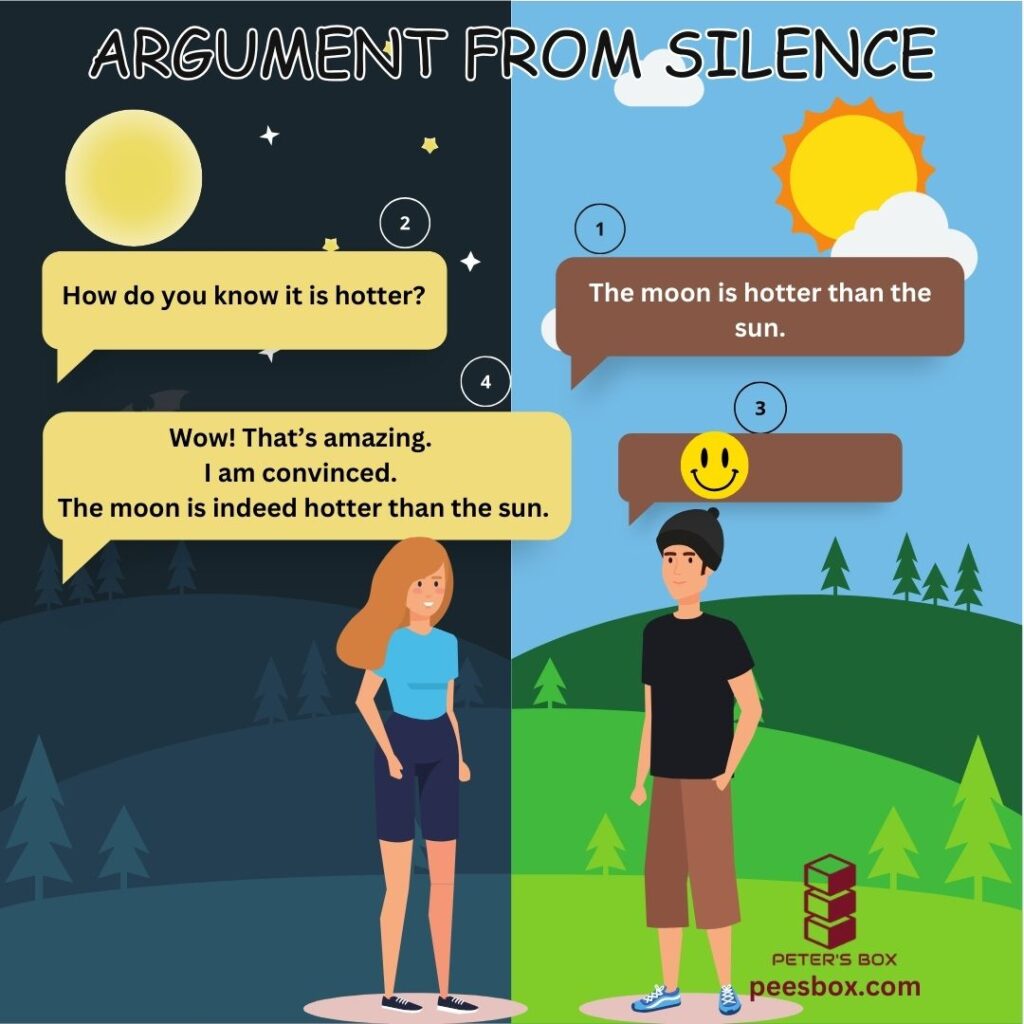
One more example
Kofi: Do you know where my brother is?
Ama: Yes, but I am not going to tell you.
Kofi: Then you don’t know where my brother is.
Bonus example
Politician A: When we come into power, we will build more schools.
Audience cheers!
Politician B: Why won’t you build hospitals?
Politician A: We will also build more factories.
Politician B: My opponent does not care about healthcare.
Related fallacies
Other fallacies that behave like the argument from silence are the strawman fallacy and hasty generalisation.
As the term suggests, hasty generalisation occurs when a conclusion is drawn based on scant or restricted knowledge. If you infer that all dogs are brown because your dogs are brown, you have made a hasty generalisation.
Straw man occurs when one takes an opponent’s claim, twists it into something else, and argues against the twisted form of the original claim. Instead of arguing against the claim raised by an opponent, you rather argue against a similar form of the claim that you have created yourself.
What’s next in Peter’s Box? ¡Hasta luego amigos!


